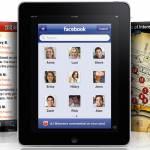'Apple iPad was my idea'

I've been awfully hard on Apple's iPad, criticalness that I really should consider, for a surprising reason. With iPad, Apple took the approach that I recommended nearly a year ago. Microsoft's current, catchy PC operating system marketing campaign ends with some consumer asserting: "Windows 7 was my idea." Perhaps I should claim that "Apple iPad was my idea." ;-)
Some background: In early 2009, as the economy sucked growth from the PC market, netebook sales surged and Windows OEMs slashed prices, there were many calls by Wall Street analysts and pundits for Apple to release a netbook and to slash Mac prices. I opposed both ideas in several blog posts. I've called netbooks a menace, because they suck margins out of the PC market without offering much value to the computer manufacturer or netbook buyer. Meanwhile, Mac price cuts made no sense to me, even as more analysts called for them. Apple has established a premium brand that price cuts would jeopardize, all while reducing margins and offering little other business benefit. Apple had long priced against itself rather than against Windows PCs, which has been a successful strategy. Why change it?
Beyond obsolescence: What Microsoft Office can become

The original reason for Microsoft Office's existence was to provide retailers with an incentive to move product that wasn't moving. The bundle created a discount deal that enabled the momentum behind Excel, which was hot, to help push Word, which was not. It had hardly a tenth of the sales volume of WordPerfect, and Word was a product that retailers had to actively work to sell. This was at a time when software consumed shelf space in stores and was sold like automobiles -- a time which is now essentially gone.
The idea that Office could be a platform came later, with Microsoft's realization -- albeit a late one, and a hard sell for a lot of us outside the company to have made -- that there was more to this multitasking thing than linked and embedded objects. I was a very early believer in the ideal that an application could be customized to suit the functions, requirements, and even tastes of the businesses that use it. I'm proud to say I've had more than just a voice in helping to bring that reality about. It would be a false statement for me to say I predicted this from my seat on the sidelines and it came about; I got off the sidelines, took my tools with me, and worked to bring it about.
Let's stop the iPad whining: It's not about the hardware

It's almost embarrassing...Correct that, it's big time embarrassing, for me to read some of the public's response to yesterday's announcement of the Apple iPad.
Yes, we know that the name is thematically close to a certain feminine hygiene product. No, we don't need to read the obvious over and over in the comments section of every tech and mainstream Web site, blog, Facebook page, Twitter stream, and (gee, thanks, Brian Williams) nightly newscast. We get it. It may have been funny when we were in the second grade, but now that we're all supposedly adults, it strikes me as needlessly juvenile.
12 reasons why I won't buy an Apple iPad

Yesterday, I asked Betanews readers if they would buy and Apple iPad. You responded with a resounding, "No!" I won't buy one either, and I've got 12 reasons why. I couldn't limit the list to the usual 10. I've got a dozen.
For me, there's relief in yesterday's iPad announcement. After nearly a month of insanity -- with geekdom acting like Jesus was coming on the clouds to set up his heavenly kingdom -- the aura is fading. Apple's tablet didn't live up to the hype or the lofty "it will change the world" expectations so many people attached to it. Some pundits called Apple's smartphone the Jesus phone. I don't expect that many will assign such aspirations to iPad, which isn't the slightest bit category changing.
Betanews readers say 'No!' to Apple iPad

Mid-afternoon today, I asked Betanews readers: "Will you buy an Apple iPad?" The responses are in, and the majority of readers say: "No!" I'm with you. Apple's iPad does absolutely nothing to advance the tablet category. The category is part of the problem. Twenty-five days ago I asserted that the "world doesn't need an Apple tablet, or any other." The iPad, like other tablets, suffers the middle child syndrome. The device overlaps features of smartphone below and laptop above.
Perhaps iPad would make more sense if it could replace either smartphone or laptop -- although I expect some early adopters to try the latter. To you I say, "Good luck!" You'll need it if for no other reasons than the virtual keyboard and limited storage -- 16GB to 64GB. I don't see these reasons as limitations on a smartphone, because it's always carried and has constant data connection. The iPad is an extra carryall with overlapping functionality and either no constant connection or 3G service for extra $30 monthly cost. Sadly, iPad is exactly what I expected: Traditional tablet form factor with a prettier user interface. Yesterday I pined for more, but Apple didn't deliver it.
The one reason why I would buy an Apple tablet

For a month, I've grappled with the "Why?" of an Apple tablet. Why should Apple make a tablet? Why could Apple succeed in a category where so many other companies have failed? Why would I --or anyone else -- want to buy an Applet tablet? No answer, despite all the plausible rumors about the device, could convince me "Why?" Until tonight. I thought of a "What?" that would make me interested in a portable tablet: Delivery of a unified content platform, mixing different media types and live information.
The rumors about Apple's tablet have focused on disparate content consumption (or creation) -- videos, music, ebooks and games among others. Big deal. These capabilities are available on PCs and smartphones or single-function devices. Disparate content on a slate does not excite my gadget geek cortex.
Twitter couldn't save Brangelina
![A morphed photograph of Brad Pitt with Angelina Jolie. [Courtesy MorphThing.com]](https://betanews.com/wp-content/uploads/media/44/4422-150x150.jpg)
I'm not one to follow the lives of celebrities. I don't watch TMZ, and the very sound of Entertainment Tonight's Mary Hart's voice is enough to make me nauseous. I turn my head as I walk past the supermarket tabloids in the checkout aisle because I could care less who Jennifer Aniston is dating this week or that Elvis was spotted in a rural Kentucky laundromat. I've got better things to do with my life than wonder how many more kids Angelina Jolie and Brad Pitt want to adopt or when she plans on getting another tattoo.
For all my celeb-fatigue, though, I found it interesting this past weekend when I first learned about the Brangelina supercouple's separation not from television, radio, or a newspaper, but from my Twitter feed. After I sarcastically retweeted the supposed news, I heard from a number of friends that they, too, had gotten the news from online sources.
Microsoft Office is obsolete, or soon will be

This month's Office 2010 retail pricing announcement and ongoing discounts for Office 2007 Home and Student are Microsoft's tacit acknowledgment that the productivity suite isn't as valuable as it once was. Office is tracking a course of unplanned obsolescence and the inevitable end shared by oh-so many other products: Commoditization. Desktop productivity suite commoditization is inevitable, and it is a force that Microsoft can resist but not stop. Additionally, Microsoft faces a fundamental shift in what content people create and where. Commoditization and the emerging mobile device-to-cloud services applications stack are Office killers.
I'll ask upfront: Do you really need Microsoft Office on a daily basis? Is Office vital to your work day? Do you use it at home? If you use it at work, how often? If you use it at home or for college, how often? Please respond in comments.
The Internet Explorer fracas: Let's find something else worth dumping

Fair warning, everyone: What follows is my opinion. Given the propensity of opinion traffic on the Web, I shouldn't have to say this: It truly is my opinion. Nothing to which I attach my byline or my face has been adjusted or colored in order to more thoroughly polarize my characterization of the subjects I cover, or to agitate your feelings so as to prompt you to post comments.
In fact, in all sincerity, I realized long ago that I'm not a very polarizing figure, I've accepted that fact, and I've come to embrace it. The art of persuasion, I was taught centuries ago, was developed with the aim of getting other people to agree with you. I'd like to get a hold of the person by the tea bags who came up with this notion that popularity must be driven by populism, which in turn can only be generated through agitation, anger, and outrage, hoist him onto a flagpole, and tell him flat out, "Rush, Americans are smarter, more sensible, wiser, and more capable than you think they are or than you would have them become."
Microsoft, don't give up on Steve Ballmer just yet

Ten years ago last week -- Jan. 14, 2000 -- Steve Ballmer took over the chief executive's position as Bill Gates stepped back to be Microsoft chairman and chief software architect. Ballmer has officially entered his second decade as Microsoft's CEO. There are fairly constant complaints about Microsoft's performance under his leadership.
NBC is sending Conan O'Brien packing; today ends his seven-month career as "The Tonight Show" host. Should Microsoft do something similar -- remove Ballmer and replace him with someone else, even Gates in a move like Jay Leno coming back and replacing O'Brien? I expect that many commenters to this post will answer "YES!" to that question. But I wouldn't give up on Ballmer just yet.
Data encryption tool maker: Antivirus has become ineffective

The following commentary is by Mark Smail, the CTO of Onix International, which distributes a data encryption tool called EncryptStick, designed to work with USB thumb drives. This is not an advertisement; Betanews is merely presenting Mr. Smail's point of view.
Consumers are growing increasingly comfortable storing sensitive information on their computers, USB flash drives, and external hard drives, as well as using Web-based solutions to automate regular tasks such as shopping for holiday gifts, paying bills, and tracking financial portfolios. The push from vendors encouraging their customers to move toward e-billing has also played a major role in more personal information being stored locally on personal computers.
Google's deal with the devil: Declaring war in China while competitors wimp out

I was just old enough to remember, and appreciate the significance of, the Tiananmen Square Massacre in 1989. The iconic image of a dissident standing defiantly in front of a column of People's Liberation Army tanks is as powerful today as it was when we first saw it.
Back then, activists fighting for greater freedom used surreptitiously acquired fax machines to get the word out to the rest of the world. It was an early sign that technology held the potential to undercut control-freak-government efforts to stifle free speech. Now that the Internet has taken over as the platform of choice for Chinese freedom-lovers and freedom-crushers alike, the battleground has shifted irrevocably, and the autocratic Chinese government hardly has enough political officers to keep its spy game machinery in balance.
Hey, Microsoft, Internet Explorer security talk is cheap

Why don't you clam up and do something already?
On Sunday, I asked question "Should you dump Internet Explorer, NOW?" and quickly offered yes as the answer for all versions of the browser. Reaction to the post surprised me. As I write, there are more than 155 comments. Clearly, IE is a sensitive topic with readers -- and also with Microsoft, which has once again taken a "security by PR'' approach to the problem rather than to offer a real solution.
The narrowing divide between the rest of the world and Haiti

Betanews urges its readers everywhere to contribute to the effort to restore vital services to Haiti, by contributing to the Clinton Bush Haiti Fund today.
I'm of two minds as I watch the heart-wrenching disaster unfold in Haiti. On the one hand, technology has been pressed into service in innovative ways to connect victims with their faraway families, to marshal resources from aid-providing nations and organizations, and to make it easier for you and me to help out by texting contributions from our mobile phones. Rescuers are Twittering, albeit haltingly, from the front lines, while Facebook pages are serving as virtual bulletin boards -- all signs that social media continues to come of age as a force for good in a less-than-fair world.
Should you dump Internet Explorer, NOW?

D`oh, now there's a redundant question.
Yesterday, ZDNET blogger Ed Bott asserted that "it's time to stop using IE6." I s-o-o-o-o disagree. For many organizations and all consumers, it's time to stop using any version of Microsoft's browser -- IE6, IE7, IE8 and forget someday releasing IE9. Less than a week ago, the German government told its citizens to switch from Internet Explorer. This is good advice for you, too.
Recent Headlines
Most Commented Stories
BetaNews, your source for breaking tech news, reviews, and in-depth reporting since 1998.
© 1998-2025 BetaNews, Inc. All Rights Reserved. About Us - Privacy Policy - Cookie Policy - Sitemap.